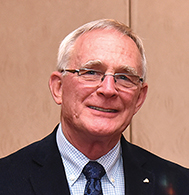He Always Made Time

He has patiently guided countless undergraduates through advising sessions and helped shape the department’s curriculum. He has devoted hours to professional development for math and science teachers at the middle and high school level to strengthen the pipeline to college physics programs, earning the 2005 Chancellor’s Citation for Excellence in Academic Outreach. And he has navigated the Tennessee Science Olympiad probably more times than he can count. After four decades with the university, Professor Stuart Elston retired in 2020.
Elston earned a BS in physics from the Rochester Institute of Technology in 1968. Following two years of service in the United States Marine Corps, he completed a PhD in physics at the University of Massachusetts at Amherst in 1975. That same year he came to the UT Physics Department as a postdoctoral research associate, joining the faculty in 1979. He was also an adjunct research and development participant with the Oak Ridge National Laboratory Physics Division from 1979 to 1996.
In the late 1990s Elston’s research interests evolved to physics and science education, partially in response to a nationwide drop in graduating BS physics majors to pre-Sputnik-era levels. Among his long list of contributions in this area was the design and implementation of Teach/Here, a teacher residency program that trained and certified career-changing math and science professionals and middle and high school math and science teachers. He was co-principal investigator on this National Science Foundation Grant, a $1.9 million initiative to improve STEM education in Tennessee. Elston also served as a higher education representative on Tennessee’s State Leadership Team for the Next Generation Science Standards on the state board’s K-12 Science Standards Review Team.
For UT’s physics majors, however, Elston’s primary influence came as adviser and teacher. He was instrumental in implementing the Studio Physics teaching paradigm in the department. He served as the undergraduate academic advising coordinator, as well as the undergraduate program director. In 2016 he was awarded the College of Arts and Sciences Faculty Advising Service Award, in part for his commitment to meet with every incoming physics major to discuss their specific interests and determine their level of preparedness. He consistently taught Physics 135-136, the introductory physics course for physical science and math majors, as well as the electronics laboratory, and it was there he made an indelible impression on so many students. Twice, including this year, he won the UT Society of Physics Students Teacher of the Year Award. And it is, perhaps, the students who draw the most vivid picture of Elston and his commitment to their education.
Last year’s SPS President, Lucas McClure, took Physics 135-136 with Elston and shared why he was the choice for Teacher of the Year:
"During that class sequence he made sure each student had a chance to ask questions, and he consistently made his best efforts to ensure we all understood the material through hosting review sessions, holding office hours, and being highly-responsive to e-mails. He had a noticeable devotion to the undergraduate program, both as an undergraduate adviser and as a professor."
Alumnus Richard Manley (BS 2001, MS 2003) still draws on lessons he learned from Elston in his work as a Research Scientist at the Naval Surface Warfare Center in Panama City, Florida.
"Dr. Elston was one of my favorite professors out of some really good professors in the physics department," he wrote. "He always made time for me in or out of the classroom to answer any question I had. I am still using things I learned from him. A couple of weeks ago I was debugging an electrical system using information and techniques I learned in his class and in front of the white board in his office. I am very aware and thankful for the contributions he has made to my career."